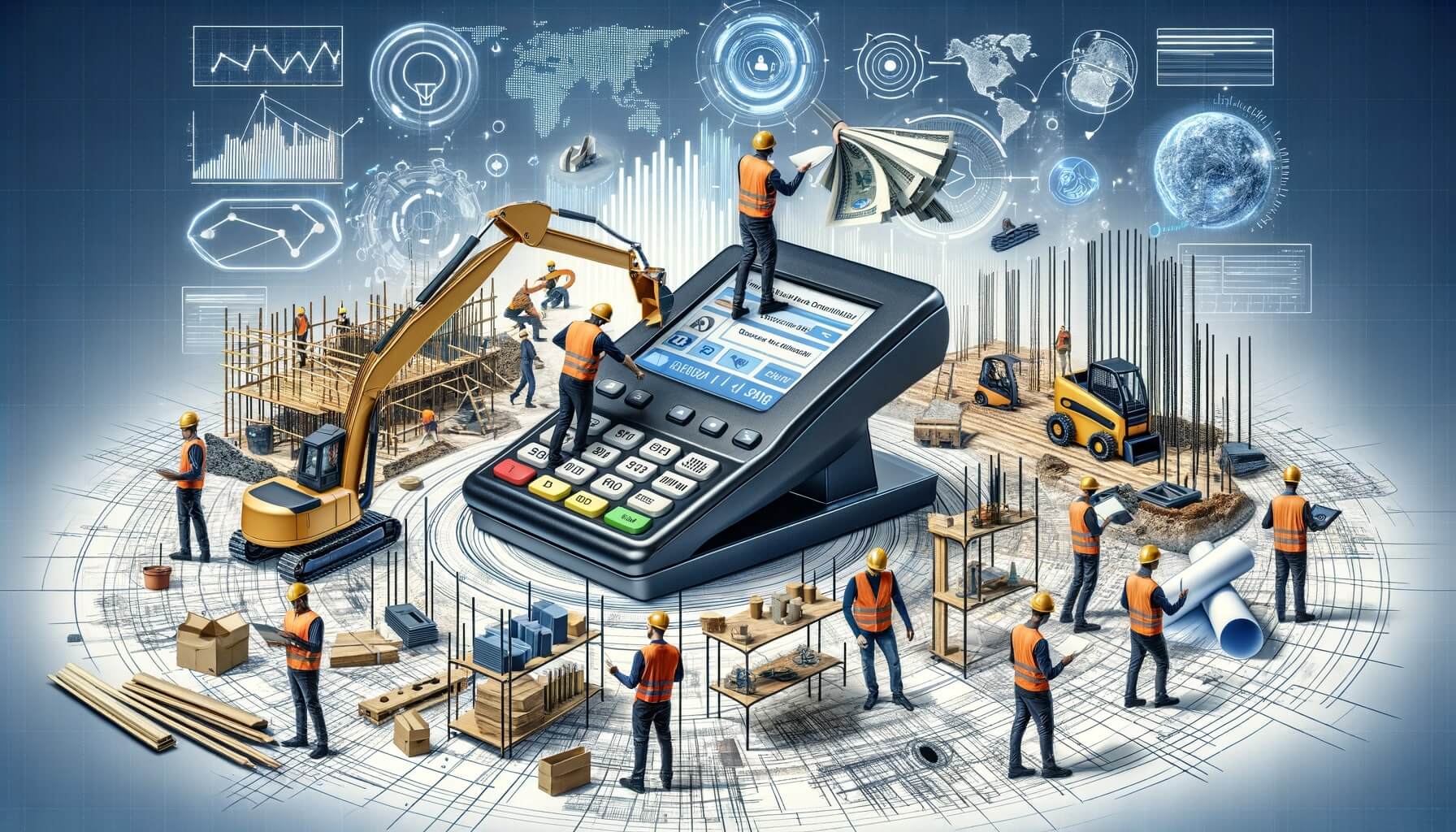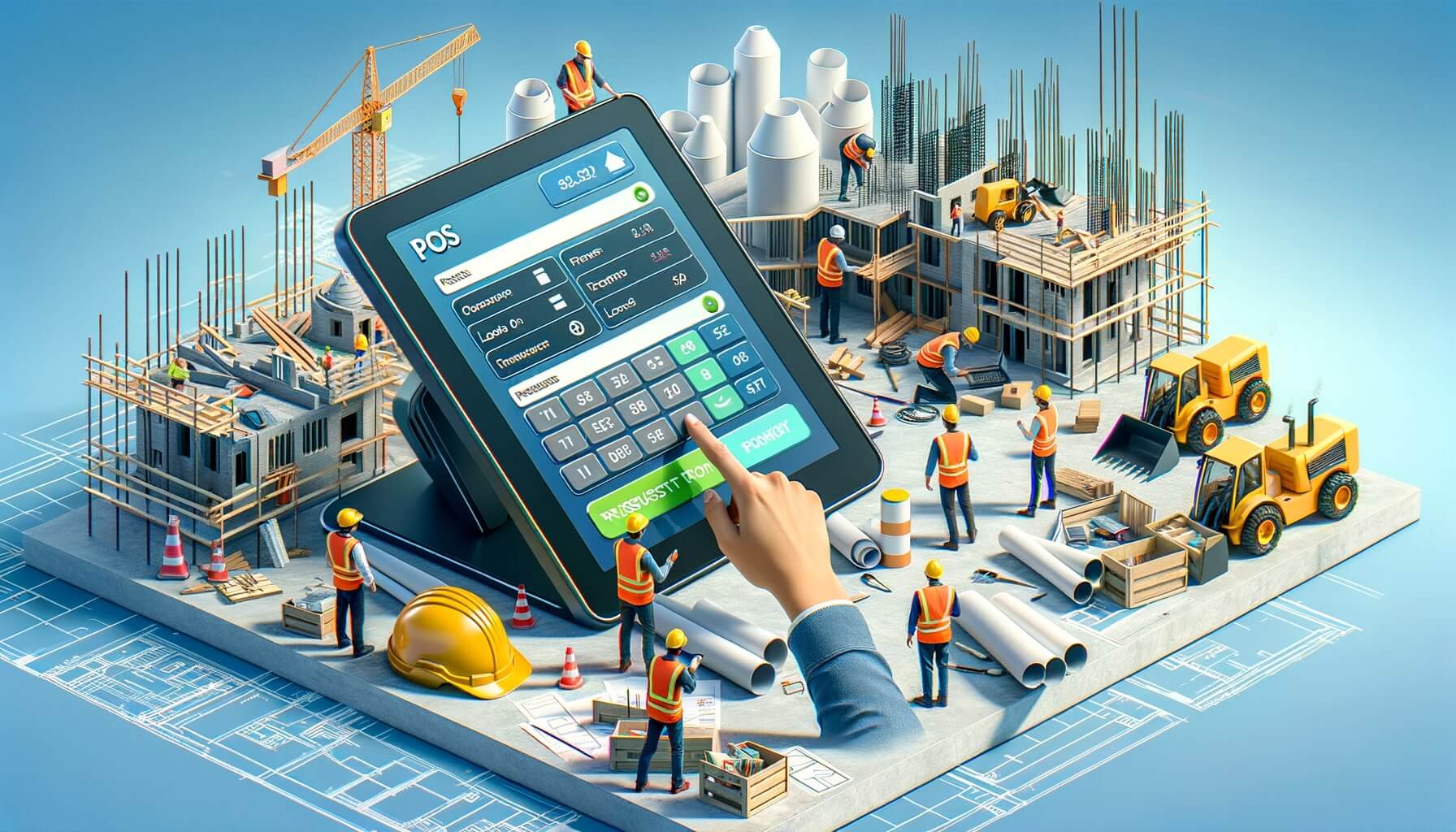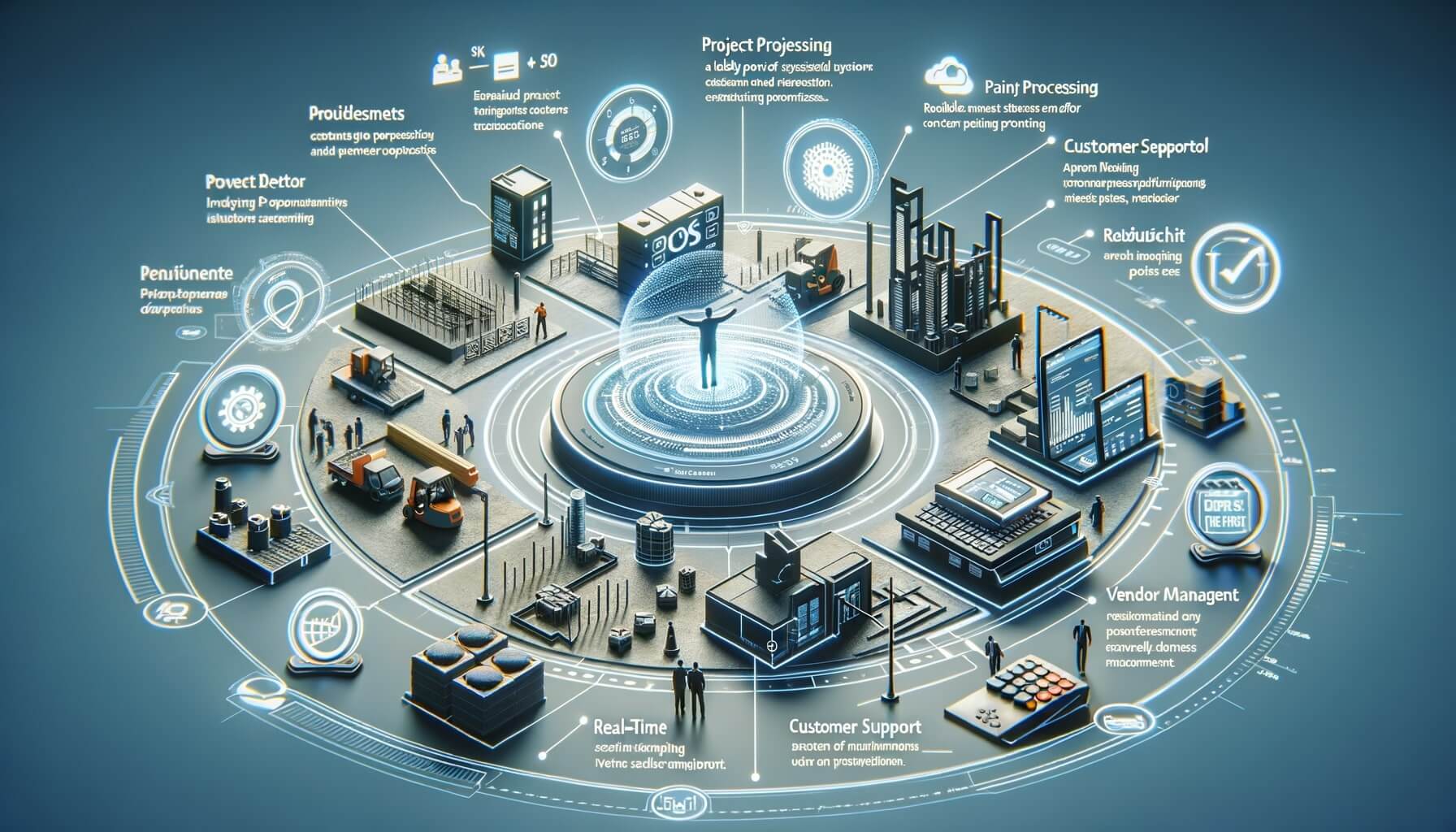
By alphacardprocess February 1, 2025
In the fast-paced world of construction, efficiency is key to success. Construction projects involve numerous moving parts, from managing materials and equipment to coordinating schedules and communicating with stakeholders. To streamline these processes and boost efficiency, construction businesses are increasingly turning to reliable Point of Sale (POS) systems.
A reliable POS system can revolutionize the way construction projects are managed, providing real-time data, improving communication, and enhancing overall project management. In this article, we will explore the importance of a reliable POS system in construction projects and how it can significantly improve efficiency.
Understanding the Basics: What is a POS System and How Does it Work in Construction?

Before delving into the benefits of a reliable POS system in construction, it is essential to understand what a POS system is and how it functions in the construction industry. A POS system, short for Point of Sale system, is a software and hardware combination that allows businesses to process transactions and manage various aspects of their operations. While traditionally associated with retail businesses, POS systems have evolved to cater to the unique needs of the construction industry.
In construction, a POS system serves as a centralized hub for managing various aspects of a project, including inventory management, project scheduling, equipment tracking, and communication with stakeholders. It allows construction businesses to streamline their operations, improve efficiency, and make informed decisions based on real-time data. By integrating various functions into a single platform, a reliable POS system eliminates the need for manual processes and reduces the risk of errors and delays.
Key Features and Benefits of a Reliable POS System for Construction Projects

A reliable POS system offers a wide range of features and benefits that can significantly enhance efficiency in construction projects. Let’s explore some of the key features and benefits of implementing a reliable POS system in the construction industry:
1. Real-time Data and Analytics: One of the most significant advantages of a reliable POS system is the ability to access real-time data and analytics. Construction businesses can track inventory levels, monitor project progress, and analyze performance metrics to make data-driven decisions. Real-time data allows for proactive management, enabling businesses to identify and address issues promptly, reducing downtime, and improving overall project efficiency.
2. Inventory Management: Managing materials and equipment is a critical aspect of construction projects. A reliable POS system provides robust inventory management capabilities, allowing businesses to track stock levels, automate reordering processes, and monitor usage patterns. By ensuring that the right materials are available at the right time, construction businesses can minimize delays, reduce waste, and optimize resource allocation.
3. Project Scheduling and Tracking: Construction projects involve complex schedules and multiple tasks that need to be coordinated effectively. A reliable POS system enables businesses to create and manage project schedules, assign tasks to team members, and track progress in real-time. This feature ensures that projects stay on track, deadlines are met, and resources are allocated efficiently.
4. Equipment Tracking and Maintenance: Construction projects often require the use of expensive equipment and machinery. A reliable POS system allows businesses to track the location, usage, and maintenance history of equipment. By ensuring that equipment is properly maintained and utilized, construction businesses can minimize downtime, reduce repair costs, and extend the lifespan of their assets.
5. Document Management: Construction projects involve a vast amount of paperwork, including contracts, permits, and drawings. A reliable POS system provides document management capabilities, allowing businesses to store, organize, and retrieve documents easily. This feature eliminates the need for manual filing systems, reduces the risk of document loss, and improves collaboration among project stakeholders.
6. Mobile Accessibility: In the construction industry, mobility is crucial. A reliable POS system offers mobile accessibility, allowing project managers and field workers to access project information, update schedules, and communicate with team members from anywhere, at any time. This feature improves communication, enables real-time decision-making, and enhances overall project efficiency.
Choosing the Right POS System for Your Construction Business: Factors to Consider

When selecting a POS system for a construction business, several factors need to be considered to ensure the right fit. Here are some key factors to consider when choosing a reliable POS system for your construction business:
1. Scalability: Construction businesses often experience fluctuations in project sizes and requirements. It is essential to choose a POS system that can scale with your business needs. Look for a system that can handle both small and large projects, accommodate multiple users, and support future growth.
2. Integration Capabilities: A reliable POS system should seamlessly integrate with other software and systems used in the construction industry, such as accounting software, project management tools, and equipment tracking systems. Integration capabilities ensure smooth data flow and eliminate the need for manual data entry.
3. User-Friendly Interface: Construction projects involve various stakeholders, including project managers, field workers, and subcontractors. It is crucial to choose a POS system with a user-friendly interface that can be easily adopted by all users. A system with intuitive navigation and clear instructions will minimize training time and maximize user adoption.
4. Customization Options: Construction businesses have unique requirements and workflows. Look for a POS system that offers customization options, allowing you to tailor the system to your specific needs. Customization options ensure that the POS system aligns with your existing processes and enhances efficiency.
5. Customer Support and Training: Implementing a new POS system can be a complex process. Choose a provider that offers comprehensive customer support and training to ensure a smooth transition. Look for providers that offer on-site training, 24/7 technical support, and regular system updates.
Implementing a POS System in Construction: Step-by-Step Guide

Implementing a POS system in a construction business requires careful planning and execution. Here is a step-by-step guide to help you successfully implement a POS system in your construction business:
1. Assess Your Business Needs: Before implementing a POS system, assess your business needs and identify the specific areas where you need improvement. Determine the key features and functionalities that are essential for your construction projects.
2. Research and Shortlist POS Providers: Conduct thorough research to identify reputable POS providers that specialize in the construction industry. Consider factors such as industry experience, customer reviews, and the range of features offered. Shortlist a few providers that align with your business needs.
3. Request Demos and Evaluate Features: Contact the shortlisted POS providers and request demos of their systems. Evaluate the features and functionalities offered by each provider, paying close attention to how well they meet your specific requirements. Consider factors such as ease of use, customization options, and integration capabilities.
4. Check References and Customer Support: Ask the shortlisted providers for references from existing construction clients. Contact these references to gather feedback on the provider’s customer support, system reliability, and overall satisfaction. Ensure that the provider offers comprehensive customer support and training.
5. Make a Decision and Negotiate Terms: Based on your evaluation, select the POS provider that best meets your business needs. Negotiate the terms of the contract, including pricing, implementation timeline, and ongoing support. Ensure that all terms are clearly defined and documented.
6. Prepare Your Team: Before implementing the POS system, prepare your team for the upcoming changes. Communicate the benefits of the new system, provide training sessions, and address any concerns or questions. Ensure that all team members understand their roles and responsibilities in using the POS system.
7. Data Migration and System Setup: Work closely with the POS provider to migrate your existing data to the new system. Ensure that all data is accurately transferred and that the system is set up according to your specific requirements. Test the system thoroughly to identify and resolve any issues before going live.
8. Train Your Team: Provide comprehensive training to all team members who will be using the POS system. Conduct training sessions that cover all aspects of the system, including data entry, inventory management, project scheduling, and reporting. Offer ongoing support and refresher training as needed.
9. Monitor and Evaluate: Once the POS system is implemented, closely monitor its performance and gather feedback from your team. Evaluate the system’s effectiveness in improving efficiency, reducing errors, and streamlining processes. Make adjustments and refinements as necessary to maximize the system’s benefits.
Streamlining Project Management with a Reliable POS System: Best Practices
A reliable POS system can significantly streamline project management in the construction industry. Here are some best practices to maximize the benefits of a POS system in project management:
1. Centralize Project Information: Use the POS system as a centralized hub for all project information. Store project schedules, task assignments, and communication logs in one place to ensure easy access and collaboration among team members.
2. Set Clear Goals and Deadlines: Clearly define project goals and set realistic deadlines using the POS system. Assign tasks to team members and track progress in real-time. Regularly review project status and make adjustments as needed to ensure timely completion.
3. Utilize Real-time Data: Leverage the real-time data provided by the POS system to make informed decisions. Monitor inventory levels, track project costs, and analyze performance metrics to identify areas for improvement and optimize resource allocation.
4. Foster Collaboration: Encourage collaboration among project stakeholders using the POS system. Enable real-time communication and document sharing to ensure that all team members are on the same page. Use the system’s collaboration features to streamline communication and minimize delays.
5. Regularly Update and Review: Regularly update project information in the POS system to ensure accuracy and relevance. Conduct regular reviews of project progress, costs, and resource allocation to identify potential issues and make necessary adjustments.
Enhancing Efficiency in Material Management through a POS System
Efficient material management is crucial for the success of construction projects. A reliable POS system can significantly enhance efficiency in material management. Here are some ways a POS system can improve material management in construction:
1. Real-time Inventory Tracking: A reliable POS system allows construction businesses to track inventory levels in real-time. By knowing the exact quantity of materials available, businesses can avoid stockouts, reduce waste, and optimize resource allocation.
2. Automated Reordering: With a POS system, businesses can automate the reordering process for materials. The system can be set to generate purchase orders automatically when inventory levels reach a certain threshold. This feature ensures that materials are replenished in a timely manner, minimizing delays and downtime.
3. Barcode Scanning: A POS system equipped with barcode scanning capabilities simplifies the process of receiving and tracking materials. By scanning barcodes, businesses can quickly update inventory levels, reduce manual data entry errors, and improve overall accuracy.
4. Material Usage Tracking: A reliable POS system allows businesses to track the usage of materials in real-time. By monitoring material usage patterns, businesses can identify inefficiencies, reduce waste, and optimize resource allocation.
5. Cost Tracking: A POS system can track the cost of materials used in construction projects. By accurately tracking costs, businesses can analyze project profitability, identify cost-saving opportunities, and make informed decisions regarding material selection and procurement.
Improving Communication and Collaboration with a POS System in Construction
Effective communication and collaboration are essential for the success of construction projects. A reliable POS system can significantly improve communication and collaboration among project stakeholders. Here are some ways a POS system can enhance communication and collaboration in construction:
1. Real-time Communication: A reliable POS system enables real-time communication among project stakeholders. Team members can communicate through the system’s messaging features, eliminating the need for separate communication channels. Real-time communication ensures that all team members are updated promptly and can address issues promptly.
2. Document Sharing: A POS system provides a centralized platform for sharing project documents. Team members can upload and access documents such as drawings, permits, and contracts, ensuring that everyone has the most up-to-date information. This feature eliminates the need for manual document sharing and reduces the risk of version control issues.
3. Task Assignment and Tracking: A reliable POS system allows project managers to assign tasks to team members and track their progress in real-time. Team members can update task statuses, provide updates, and request assistance through the system. This feature ensures that tasks are completed on time and that project managers have visibility into the progress of each task.
4. Collaboration on Schedules: A POS system enables collaboration on project schedules. Team members can view and update project schedules in real-time, ensuring that everyone is aware of any changes or delays. This feature improves coordination among team members and minimizes scheduling conflicts.
5. Mobile Accessibility: A reliable POS system with mobile accessibility allows field workers to access project information and communicate with team members from anywhere, at any time. This feature improves communication between the field and the office, enables real-time decision-making, and reduces delays.
Addressing Common Concerns and FAQs about POS Systems in Construction
While a reliable POS system offers numerous benefits for construction projects, there may be some common concerns and questions. Let’s address some of the frequently asked questions and concerns about POS systems in construction:
Q1. Is a POS system suitable for small construction businesses?
A1. Yes, a POS system can benefit businesses of all sizes. Many POS providers offer scalable solutions that can be tailored to the specific needs of small construction businesses. By automating processes and providing real-time data, a POS system can help small businesses improve efficiency and compete with larger competitors.
Q2. Will implementing a POS system be time-consuming and disrupt ongoing projects?
A2. Implementing a POS system may require some initial time and effort, but the long-term benefits outweigh the short-term disruptions. Proper planning, training, and support from the POS provider can minimize disruptions and ensure a smooth transition. It is advisable to implement the system during a relatively less busy period to minimize the impact on ongoing projects.
Q3. How secure is the data stored in a POS system?
A3. Data security is a top priority for POS providers. Reputable POS systems use advanced encryption and security measures to protect sensitive data. It is essential to choose a POS provider that complies with industry standards and regulations to ensure the security of your data.
Q4. Can a POS system integrate with existing software and systems?
A4. Yes, many POS systems offer integration capabilities. It is crucial to choose a POS system that can seamlessly integrate with your existing software and systems, such as accounting software, project management tools, and equipment tracking systems. Integration ensures smooth data flow and eliminates the need for manual data entry.
Q5. What if I need technical support or training after implementing the POS system?
A5. Reputable POS providers offer comprehensive customer support and training. Look for providers that offer 24/7 technical support, on-site training, and regular system updates. Ensure that the provider has a dedicated support team that can address any technical issues or questions that may arise.
Conclusion
In conclusion, a reliable POS system can significantly boost efficiency in construction projects. By providing real-time data, streamlining project management processes, enhancing material management, and improving communication and collaboration, a reliable POS system revolutionizes the way construction projects are managed.
Construction businesses should carefully consider their specific needs and requirements when choosing a POS system and follow best practices for implementation and adoption. With the right POS system in place, construction businesses can optimize resource allocation, reduce costs, and complete projects more efficiently, ultimately leading to increased profitability and client satisfaction.